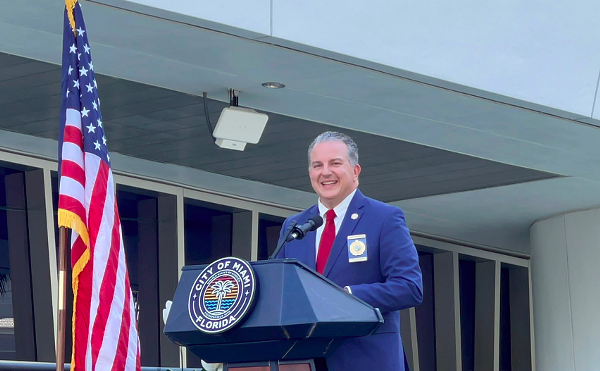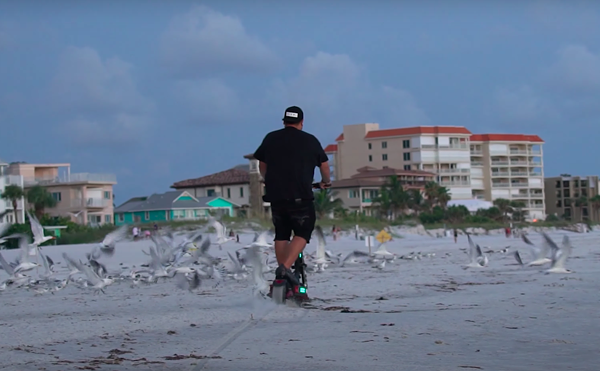
I wasn't quite sure what to expect as I sat down in the brown vinyl booth at the Village Inn that Tuesday afternoon. I'd never talked in any depth with someone suffering from post-traumatic stress disorder (PTSD). But as Sgt. Dale Cage began talking, I realized just how much I didn't know — and how difficult it was going to be for me to learn.
Cage is stocky, 44 years old, with a short moustache and receding gray-blonde hair. A sergeant in the Army Reserves, Cage was a member of the 196th Transportation Company, a group out of Orlando made up mostly of truck drivers, cargo handlers and police officers. During the year the 196th was in Iraq, they spent most of their time driving supplies to troops on the front lines, often through hostile territory.
Dale Cage saw two things as he crossed the Kuwaiti border into Iraq in April 2003: sand and cars. Lining the road on either side were blown-out automobiles, remnants of earlier wars half buried in the desert. "It was like a graveyard," he says.
These were the earliest days of the war, and Cage remembers them vividly. He can describe the grit of the sand between his teeth as he chewed his dehydrated meals, the makeshift turrets his men fashioned for their trucks, and the worn-out smell of his Vietnam era flak jacket. But get him talking about the rest of his time in Iraq, and Dale Cage will have trouble recalling much of anything.
"I remember the first few months," he said to me early on in our conversation at the Village Inn. "And I remember the last few. But the time in the middle is a blur."
Yet not everything during that time has been lost.
Cage remembers having to outfit his trucks with scrap metal — a widespread equipment problem that has only recently made headlines. Cage had to deal with the shortage throughout his tour, and says the latest uproar has come too late. But as he talked about his trucks, Cage veered off topic just for a moment and slipped into one of his countless nights in Iraq.
"Some nights it seemed like you were at Disney World," he told me. "Other nights it was like being at Fourth of July with incoming — shit dropping on top of you. There were several nights I remember when we were sleeping on the top of the trucks and all hell broke loose in the compound we were sleeping in. Everybody was rolling off the back of the trucks, off the top of the trucks, hitting the ground because in-coming rounds were coming at us."
Even if it was just for a second, Sgt. Cage was back on the battlefield. His eyes started to blink a little faster, his words — usually well thought-out and slowly spoken — started to spew from his mouth. But then he paused, took a sip of his coffee.
"It was weird. It really was," he said. It was as close as we would come to the horrors of war.
As the conversation moved out of Iraq and into its second hour, Sgt. Cage described his struggle since getting home. He had a choice when he got back to Ft. Stewart, Ga.: stay there for treatment for his injuries (he says he came home with a bad back, knee trouble and rapid tooth decay) or head to Tampa and contact the VA. "Most people wanted to get the hell away from the military," Cage says. That's what he wanted, too.
The anxiety attacks first hit when Cage was in England for his cousin's wedding a few weeks later. "You'd be sitting there — I'd be sitting there — and all of sudden tense up for no reason," he says. "I could feel it coming on. Then all of a sudden the tears would start coming out."
I should've pressed — should've asked him what makes him cry.
But I didn't. I was humbled by what he was telling me, and I was engrossed. So I shut up and listened.
"Not knowing when it was going to do it was probably the most nerve-racking thing," he said of the anxiety attacks. "You're used to driving so many miles like I was doing, but now I have problems even driving to the store."
"Is there something specific about driving that triggers those memories?" I asked, interjecting a difficult question for the first time all afternoon.
"I have no idea," he said, snapping a sugar packet against his mug before pouring it in his third cup of the afternoon. I walked out of the Village Inn sure I'd gotten exactly what I had come looking for. If nothing in my notebook proved it immediately, my conversation with Sgt. Cage had at least sufficiently shaken me up, which I think is part of what I was hoping for. I'd spent enough time talking to counselors at VA hospitals and Vet Centers before I met Cage that I had a pretty good handle on the clinical definition of PTSD. But this was the first time I'd seen it face to face — "straight from the horse's mouth," as Cage had said — and it was raw. The man was suffering.Yet in the days following our conversation, as I pored endlessly over the tape I'd made, I couldn't find the specific words that had affected me so much. I listened to the recording, all two and half hours of it, over and over again — in the car, at work, even just before I fell asleep — hoping that somehow that one quote would magically appear. It had to be there — he must have explained to me at some point exactly what it was like to go to war, to fight, and to come home.















